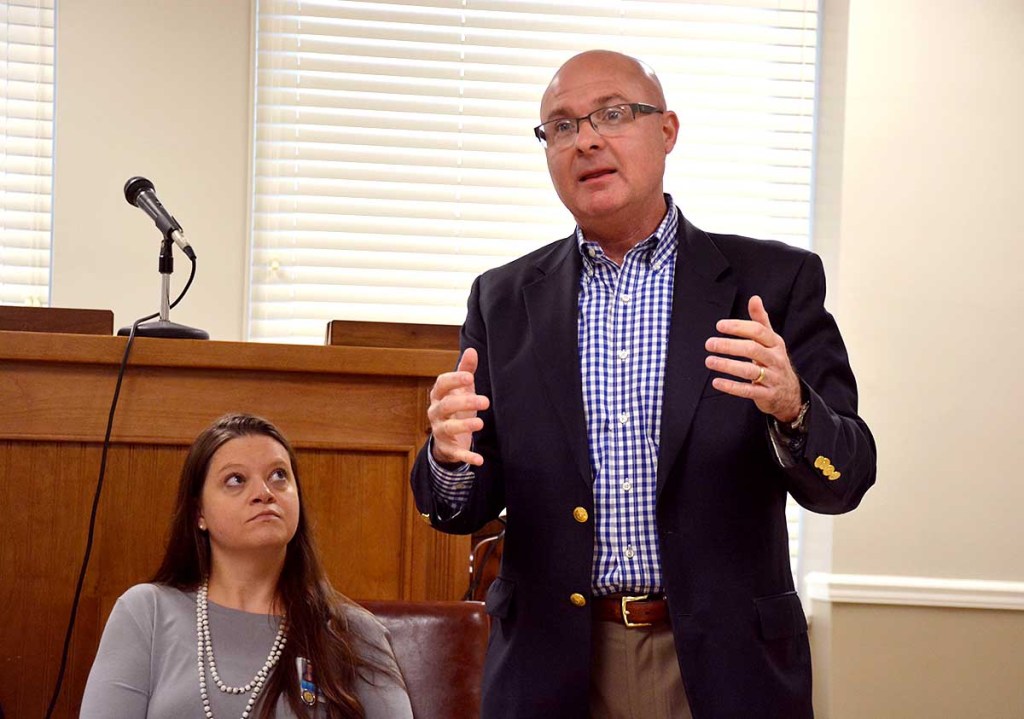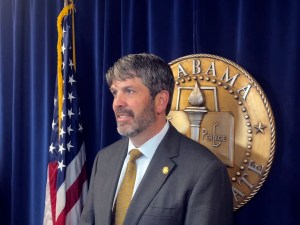Advisory council prepares to launch funding campaign for mental healthcare
Published 5:30 am Saturday, April 7, 2018

- Neal Morrison, standing, speaks at a press conference in April to discuss a mental healthcare initiative in Cullman County.
Mental healthcare in Cullman County will become a model for Alabama if the intent of a local advisory council is realized through a three-phase plan.
Awash in a backdrop of low funding and dwindling facilities for treatment, representatives from various institutions and organizations have spend six months meeting, examining local issues in mental health, and ultimately unveiling a plan that needs funding and longterm support, said Neal Morrison, a former legislator and state executive who is serving as the organizer of the local effort.
Trending
The three-phase plan was introduced last week, but Friday members of the council held a press conference at the Cullman County Courthouse to discuss particulars of the plan and to field questions.
“About three-quarters of a million dollars is needed for the initial budget. We get that and we can relieve pressure on the ER and the jail right away,” Morrison said. “But the long-range goal is a one-stop place to serve all the needs in mental healthcare. This include outpatient services, beds for those who need longer-term treatment, and counseling services.”
Having a free-standing facility to encompass all of those services could cost $5 million to $10 million.
But Morrison said funding can come from different sources. Grants, government commitment at the local level, private donations from foundations, industry and business, and individuals are all on the table.
“We will be moving into that phase this month, making presentations and enlisting support,” Morrison said. “We can’t sit around and wait for the federal government or the state. Yes, we will need them, but right now we need to act. This is a grass-roots effort and Cullman County has a reputation for taking action and not waiting around.”
Morrison recounted years ago how a free prescription program was started in Cullman County, which drew the attention of the state and then the federal government and became a model for medical assistance in the nation.
Trending
“That program is an example of what you can do when you are determined to solve a problem, to make life better for people in your community,” Morrison said. “Just like after the 2011 tornadoes, no one waited around in Cullman County for FEMA or anything. People went to work and started working immediately and then the other assistance arrived.”
The initial meetings of the advisory council involved frank discussions and admitting that Cullman County has a problem where mental healthcare is concerned, he said.
WellStone, which includes the former Mental Healthcare of Cullman, has closely monitored issues that affect reaching those with mental illness. For Chris Van Dyke, who heads Cullman County’s WellStone operation, said funding has played a major role in creating a crisis.
“It happens because of our tax base. Healthcare is tied to the General Fund in Alabama, which has often been stagnant through the years and has no real growth incentives,” Van Dyke said. “When that happens over a period of 15 years, it becomes a loss. The funding never increases and combine that with fewer beds for treatment and you have a situation you see here, across the state and nation.”
Morrison, from his legislative background, also noted that government determined to turn mental healthcare over to communities, but sent only the responsibility, not the money.
“The idea itself was not bad. A lot of people said sure, we’ll do it, but there was no money to come with the idea,” Morrison said. “We have to convince the state to send the money to communities where it can make a difference in people’s lives.”
Probate Judge Tammy Brown said mental illness issues for many people have become a revolving door.
“That’s why we need more outpatient services. We’ve already had five commitment hearings this week in court and one person is stuck in the ER because there is not a bed available; that’s sad and it’s just not right,” Brown said.
Morrison said the intent of taking control of the issue locally is to provide a complete system of care, not a bandage.
“We have some people who need 24/7 care and others who need access to outpatient care. We also need qualified, trained case workers to continue working with people and ensuring they are receiving the care and medications needed,” Morrison said. “We also want to see families discussing this, getting past the stigma about mental illness. Everyone of us has something we are dealing with.”
Lindsey Dossey, vice president of marketing at Cullman Regional, said the hospital has set on its website at cullmanregional.com a means for residents to make contributions into the local mental health initiative. She said the first donations have already arrived.
“No donation is too small or too large,” Dossey said. “Cullman Regional is already trying to help recruit healthcare professionals in mental health to the area.”
The advisory council started after Cullman Regional CEO James Clements contacted Morrison about the issue and asked him to bring together a wide range of people from different professions to work on a solution.
The three phases of improving and expanding mental healthcare include:
Phase 1 – Address the current crisis in the Cullman Regional Emergency Department
Due to the dramatic rise in the number of people needing inpatient care has created a crisis in local emergency departments, including Cullman Regional, which are required to provide medical clearance in order to admit patients to scarce psychiatric hospital beds. Patients routinely wait days and sometimes weeks in the emergency department as they await and search for an open psychiatric bed.
Phase 2 – Improve funding for wrap around crisis services and address statewide barriers to care
Often times, patients receive inpatient treatment and are able to return to society; however, without continuous care and programs, they frequently return back to the Emergency Department for treatment which begins the cycle over again. This phase seeks to create and or grow outpatient day programs and outreach workers who can follow people with a history of mental health illness and intervene prior to a crisis situation.
Phase 3 – Open a freestanding mental health crisis center in Cullman County
After successfully completing phase one and two, the committee believes the creation of a freestanding crisis center to provide triage and crisis treatment for adults and families with mental health or addiction crisis is the best long-term solution. The committee has reviewed several models from around the United States, and believes this will alleviate the pressure on both hospitals and local law enforcement in dealing with individuals or families in crisis.






